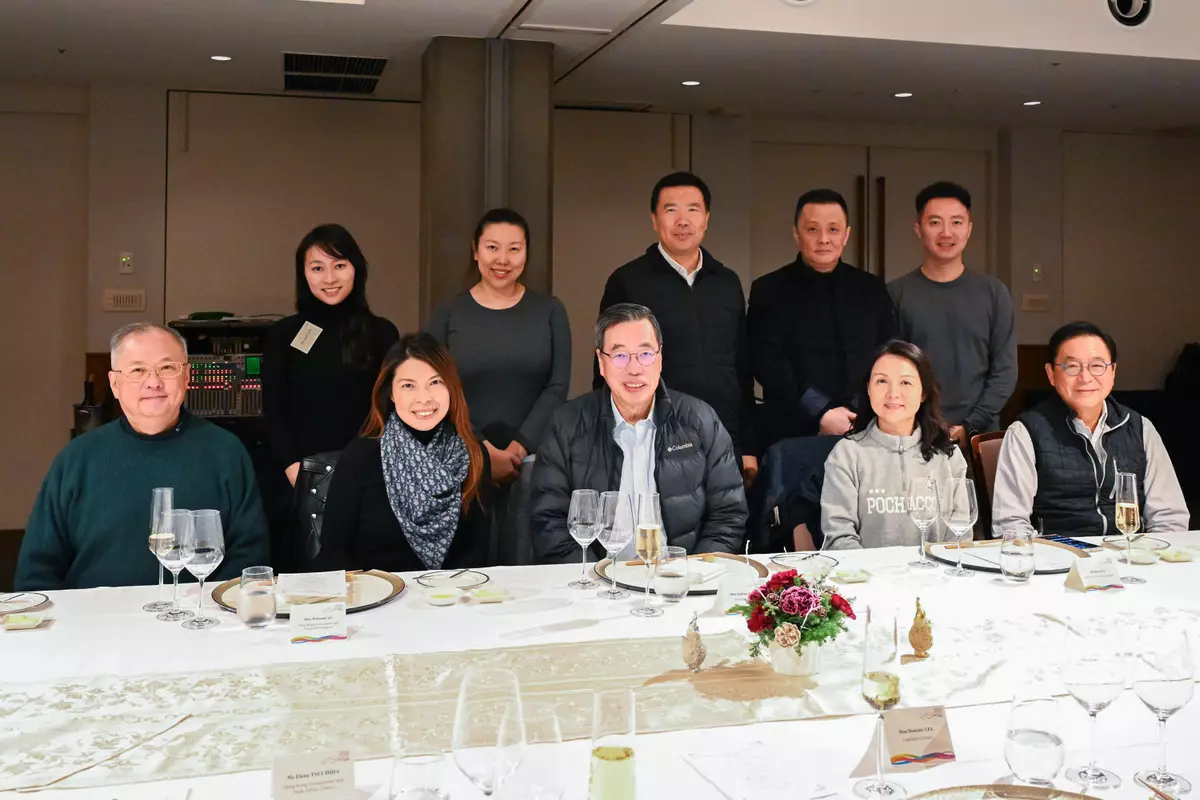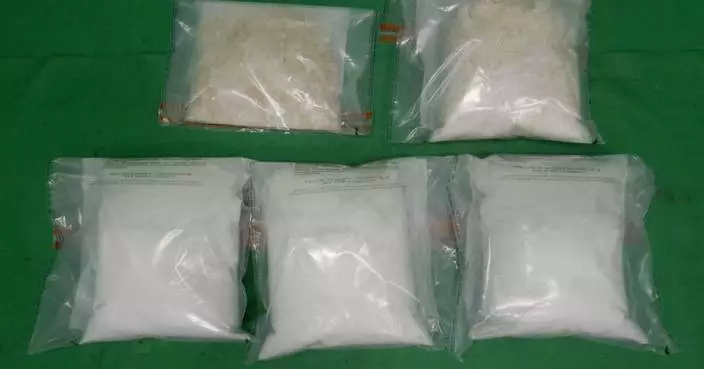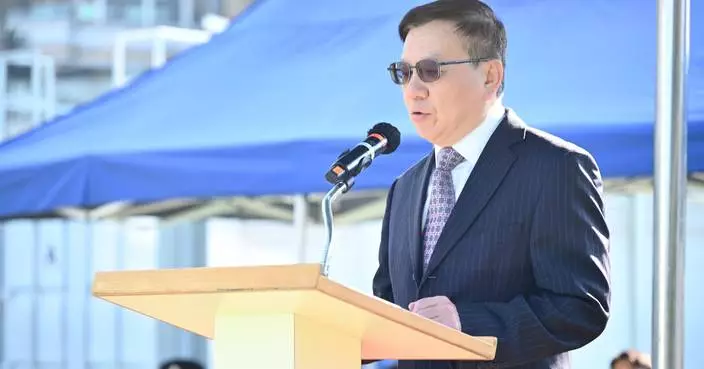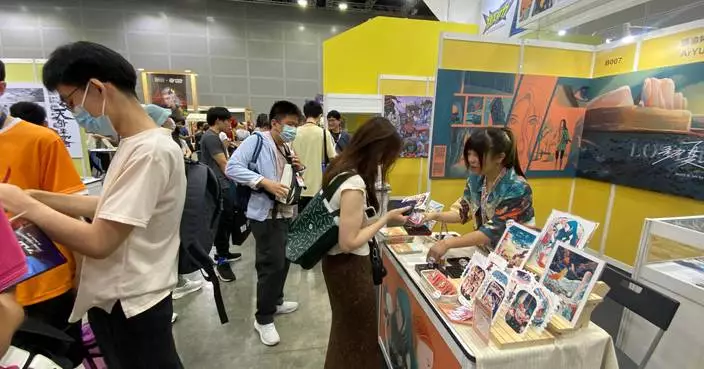CE's speech in delivering "The Chief Executive's 2024 Policy Address" to LegCo (5)
IV.Develop New Quality Productive Forces Tailored to Local Conditions
75. The core element of new quality productive forces is to achieve high‑quality economic development through technological empowerment. Hong Kong is striving to become an international innovation and technology (I&T) centre by promoting the upgrading and transformation of traditional industries while actively nurturing emerging ones. We will spare no effort in developing new quality productive forces tailored to local conditions.
(A) International I&T Centre
Optimise the Strategy and Institutional Set-up for the Development of New Industrialisation
76. We will draw up a medium to long‑term development plan for new industrialisation in Hong Kong. We will also press ahead with the establishment of the Hong Kong New Industrialisation Development Alliance to promote closer collaboration among the Government and the industry, academia, research and investment sectors, building a co‑operative platform for new industrialisation in Hong Kong. This includes providing more financing opportunities and fostering I&T co‑operation between newly‑listed companies in Hong Kong and local universities.
Establish the Third InnoHK Research Cluster
77. The InnoHK research clusters have become home to about 2 500 research and development (R&D) personnel from Hong Kong and around the world. The Government has already started preparatory work to establish the third InnoHK research cluster, which will focus on advanced manufacturing, materials, energy and sustainable development. The target is to attract world‑class R&D teams to collaborate with local institutions, promoting R&D and bringing in talents.
Increase Research Funding
78. The Government will launch a new round of Research Matching Grant Scheme totalling $1.5billion to attract more organisations to support research endeavours of institutions.
Increase Investment for I&T Industries
79. We will increase investment and guide more market capital to invest in I&T industries, reflecting a revamped approach of Government in this. Relevant measures include:
(i) setting up a $10billion I&T Industry‑Oriented Fund – We will set up a fund‑of‑funds to channel more market capital to invest in specified emerging and future industries of strategic importance, including life and health technology, AI and robotics, semi‑conductors and smart devices, advanced materials and new energy. The goal is to systematically build an I&T ecosystem;
(ii) optimising the Innovation and Technology Venture Fund – We will redeploy $1.5billion to set up funds jointly with the market, on a matching basis, investing in start‑ups of strategic industries, to further enhance Hong Kong's start‑up ecosystem; and
(iii) maximising the impact of the HKIC as "patient capital" – The HKIC will continue to attract I&T enterprises to establish their presence and settle in Hong Kong by channelling and leveraging market capital.
Attract International Start-up Accelerators to Establish a Presence in Hong Kong
80. The Government will launch the I&T Accelerator Pilot Scheme with a funding allocation of $180million at a one‑to‑two matching ratio between the Government and the institution, up to a subsidy ceiling of $30million. The Scheme aims to attract professional start‑up service providers with proven track records in and beyond Hong Kong to set up accelerator bases in Hong Kong, fostering the robust growth of start‑ups.
Develop the Low-altitude Economy
81. Low‑altitude economy, which refers to economic activities in airspace below 1 000 metres, presents a wide array of application scenarios including rescues, surveys and delivery of goods and passengers. Formulating a management system for low‑altitude economy will help drive development in areas such as telecommunication technologies, AI and the digital industry, unlocking the low‑altitude airspace as a new production factor for our economy.
82. The Government will establish the Working Group on Developing Low‑altitude Economy. Led by the Deputy Financial Secretary, it will formulate development strategies and inter‑departmental action plans, starting with projects on low‑altitude applications. It will designate specific venues for such purposes, draw up regulations and design the institutional set-up, and study and map out plans to develop the required infrastructure and networks. Relevant measures include:
(i) exploring low‑altitude flying application scenarios – We will press ahead with pilot projects and designate venues to explore deploying drones for delivery, surveys, building maintenance, aerial photography, performances, search and rescue, and other possibilities;
(ii) amending relevant regulations – This includes relaxing restrictions on beyond‑line‑of‑sight flying activities, as well as those on weight and loading of drones, encouraging market research and investment, facilitating technology tests and developing aerial tours;
(iii) promoting interface with the Mainland – We will explore with the Mainland authorities the joint establishment of low‑altitude cross‑boundary air routes, immigration and customs clearance arrangements and supporting infrastructure; and
(iv) studying and planning for low‑altitude infrastructure – In the long run, we need a highly effective, intelligent and digitalised low‑altitude infrastructure system for the real‑time management on networks of low‑altitude activities. It will strategise solutions for complex management and safety issues arising from such activities. The working group will embark on technical studies and planning of support facilities for low‑altitude activities (such as vertiports and charging stations), communications network, air route network, management of low‑altitude flying activities and so on to lay the foundation for the low altitude economy.
Promote Development of Communications Technology
83. Low Earth Orbit (LEO) satellites are less costly than traditional ones. The Government will conduct a study on streamlining the vetting procedures of licence applications for operating LEO satellites. The Government will also make available more suitable radio spectrum to the market in a timely manner.
Advance R&D of Aerospace Science and Technology
84. Hong Kong's research teams have been actively engaged in R&D of aerospace science and technology. This year, a Hong Kong resident was selected as a preparatory astronaut. We are very grateful for our country's support for Hong Kong in developing aerospace‑related technologies. The Government will set up a research centre under the InnoHK research cluster to participate in the Chang'E‑8 mission, contributing to national aerospace development.
Promote Development of New Energy
85. The Government will earmark around $750million under the New Energy Transport Fund to subsidise the taxi trade and franchised bus companies to purchase electric vehicles, and launch the Subsidy Scheme for Trials of Hydrogen Fuel Cell Electric Heavy Vehicles.
86. We will further promote the development of new energy by:
(i) setting a target for sustainable aviation fuel (SAF) consumption – We will speed up the reduction of carbon emissions by the aviation industry and cater to the increasing demand of international airlines for SAF;
(ii) developing SAF and green maritime fuel supply chains – We will formulate the long‑term plan for industry development in respect of fuel supply and demand, storage and bunkering; and
(iii) promoting green and low carbon hydrogen energy – We will actively support the industry to establish a solar‑to‑hydrogen facility for demonstration, introduce a bill next year to ensure the safe use of hydrogen fuel, and formulate the approach of hydrogen standard certification suitable to Hong Kong.
(B)Regional Intellectual Property Trading Centre
87. Hong Kong's intellectual property (IP)‑intensive industries accounted for about 30% of our Gross Domestic Product and of total employment respectively. We will strengthen our position as a regional IP trading centre by expanding the IP trading ecosystem of the I&T sector and creative industries.
Enhance the Legislative Framework for IP
88. The Government will strengthen protection for the products of innovation and creativity yielded by R&D efforts. Measures include putting forward a proposal next year to enhance the Copyright Ordinance regarding the protection for AI technology development, launching a consultation in 2025 on the registered designs regime currently under review, and proposing legislative amendments to streamline IP litigation processes for the High Court to manage and hear these cases more effectively.
89. Next year, the Trade Marks Registry under the Intellectual Property Department (IPD) will launch a new AI‑assisted image search service to facilitate the public's search of the trademark database.
90. With the Central Government's support, Hong Kong will participate in the World Intellectual Property Organization Lex‑Judgments Database next year, sharing important IP case precedents of local courts, to showcase to the international community the quality of our IP‑related judicial judgments.
Strengthen Training of IP Talents
91. The Government will continue to discuss with the patent agent sector and stakeholders to plan for the introduction of regulatory arrangements for local patent agent services, covering qualification, registration, and other areas, aiming to nurture professional talents and enhance service quality.
92. The IPD will collaborate with the Qualifications Framework Secretariat to develop practical teaching materials for deployment by training providers, benefitting personnel across 23 different industries.
(C) International Health and Medical Innovation Hub
93. To expedite patients' access to advanced diagnostic and treatment services, and to foster new quality productive forces in biomedical technology, the Government will complement technological innovation with institutional innovation, developing Hong Kong into an international health and medical innovation hub.
Reform the Approval Mechanism for Drugs and Medical Devices
94. The Government will expedite the reform of the approval mechanism for drugs and medical devices, including:
(i) extending the "1+" mechanism to all new drugs, including vaccines and advanced therapy products, and improving the approval mechanism to speed up registration, facilitating good drugs for use in Hong Kong;
(ii) devising the timetable for the Hong Kong Centre for Medical Products Regulation and the roadmap towards adoption of "primary evaluation", as well as formulating strategies and measures to facilitate R&D of drugs and medical devices; and
(iii) taking forward preparatory work for legislating for the statutory regulation of medical devices.
Strengthen Biomedical Technology R&D and Translation
95. The Government will enhance Hong Kong's clinical trial capability on all fronts and facilitate the translation of innovative biomedical research results into clinical applications by:
(i) joining hands with Shenzhen to establish the GBA Clinical Trial Collaboration Platform, extending the R&D network and expediting clinical trials;
(ii) establishing the Real‑World Study and Application Centre to open up local health and medical databases and promote co‑operation between Hong Kong and Shenzhen to integrate data generated from the "special measure of using Hong Kong‑registered drugs and medical devices used in Hong Kong public hospitals in GBA". This will accelerate approval for registration of new drugs in Hong Kong, the Mainland and overseas; and
(iii) supporting R&D, clinical trials and application of advanced biomedical technology in Hong Kong, attracting global top‑notch innovative enterprises and research organisations to set up operations in Hong Kong.
(D) Promote Integrated Development of Digital Economy and Real Economy
96. A robust system to promote integration of real economy and digital economy is one of the key drivers of new quality productive forces. The Government will expedite the development of digital economy, which includes accelerating the digital transformation of industries, strengthening digital infrastructure, exploring development of a data‑trading ecosystem, and exploring on a pilot basis facilitation arrangements for cross‑boundary data flow within the GBA.
Accelerate Development of Digital Trade
97. The Government will push forward reforms in the digitalisation of enterprises and trade. Measures include fostering participation in discussions among the international community about the development of digital economy and exploring the inclusion of relevant provisions in bilateral trade agreements during the negotiation process, with a view to promoting digital trade and cross‑boundary e‑commerce.
98. The Commerce and Economic Development Bureau is developing the Trade Single Window to provide a one‑stop electronic platform. It will help the industry lodge import and export trade documents for trade declaration and customs clearance. Separately, the HKMA has established a working group to conduct an in‑depth study into the changes in future supply chains and make recommendations. The scope of study covers promoting the digitalisation of trade through areas such as talents and financial infrastructure, as well as the technology and legal framework, with the goal to lower trade cost and upgrade the trade ecosystem.
Establish a New Fintech Innovation Ecosystem
99. The Government will continue to promote the development of innovative financial services including Central Bank Digital Currencies (CBDCs), mobile payment, virtual banks, virtual insurance and virtual asset (VA) transactions. The FSTB will shortly issue a policy statement, setting out its policy stance regarding the application of AI in the financial market. Other measures include:
(i) promoting the use of CBDCs for cross‑boundary payment – The HKMA is actively testing and exploring more add‑on technology solutions and use cases related to cross‑boundary trade settlement on the mBridge platform, and will further widen the participation of both the public and private sectors;
(ii) enhancing the regulation of VA trading – The FSTB will complete the second round public consultation on the regulatory proposals for over‑the‑counter trading of VA and put forward a proposed licensing regime for VA custodian service providers;
(iii) promoting real‑world asset tokenisation and developing a digital money ecosystem – The HKMA is taking forward Project Ensemble, a financial market infrastructure project, to explore the application of real‑world asset tokenisation and the use of digital money for interbank settlement, facilitating the development of the relevant asset trading. Separately, the HKMA also allows potential stablecoin issuers to test business plans and use‑cases through the stablecoin issuer sandbox, and will work with the FSTB to introduce a bill on the regulation of fiat‑referenced stablecoin issuers later this year; and
(iv) promoting the development of the digital securities market – The HKMA will soon launch the Digital Bond Grant Scheme to encourage more financial institutions and issuers to adopt tokenisation technology in capital market transactions.
Facilitate Cross-boundary E-commerce Logistics Services
100. To develop Hong Kong into a cross‑boundary e‑commerce logistics and distribution centre, the Government will review existing procedures to enhance the efficiency of cross‑boundary goods' distribution, strengthening the competitiveness of our city.
Promote Smart Construction and Management of Public Rental Housing Estates
101. The Hong Kong Housing Authority (HKHA) has selected 10 Public Rental Housing (PRH) estates as pilot sites for smart estate management. Next year, it will establish a central platform for property management and introduce digital technologies in daily estate management work, enhancing management effectiveness and service quality. The HKHA will also progressively apply the Project Information Management and Analytics Platform in new public housing projects starting next year, enhancing works efficiency by project management digitalisation and adopting three‑dimensional digital maps and virtual digital models, etc.
Promote LawTech
102. The DoJ will set up the Advisory Group on Promoting the Development of LawTech to formulate policies and measures on LawTech and promote its application in relevant sectors.
(To be continued.)








